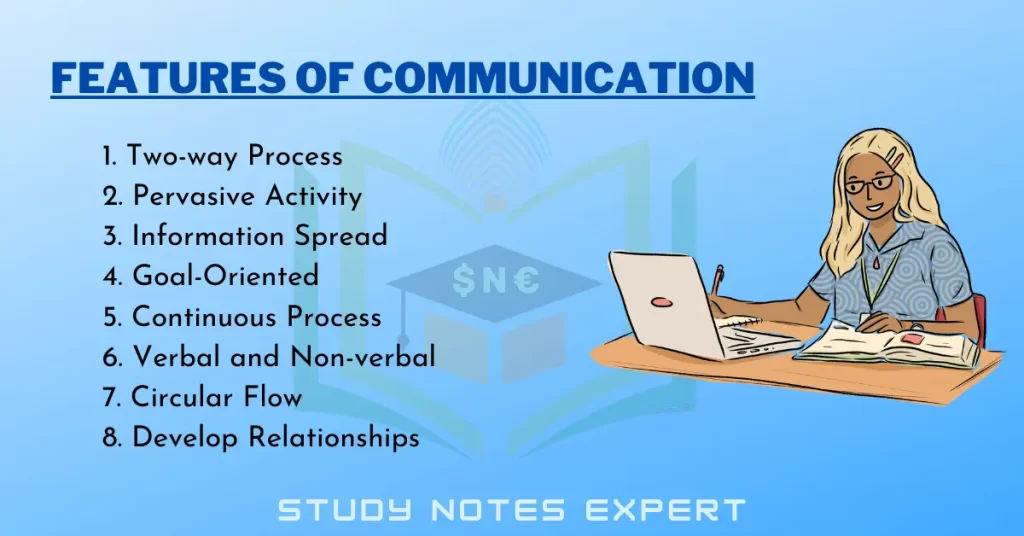Meaning of Communication
Communication has been derived from the Latin word “Communis”, which means common or “Communicare”, which means sharing information & intelligence. Also, in this article, you will know the features of communication. Some key points regarding Communication:
- Communication is simply the process of transferring meanings from sender to receiver. It is a vital part of each of us as it contributes heavily to the success or failure of every human activity. Also, it is hard to name a human activity in which Communication is not essential.
- Individuals in the organization may perform different activities, but they are functionally related. The working and maintenance of these relationships are possible only through Communication which provides for the exchange of information & sharing ideas.
- The communication transmits information not only about tangible facts & determinable ideas and opinions but also about emotions. When a communicator passes on or transmits some information, he may also, intentionally or unconsciously, be communicating his attitude or frame of mind.
Definition of Communication
Communication involves the concept of transferring meaning & information. There is a wide disagreement among communication theorists regarding the definition of Communication. Some offered their definition as follows:
- Communication is the process by which people seek to share meaning via transmission of symbolic messages. Communication is the process through which two or more persons come to exchange ideas & understanding among themselves.
- Acc. to “New Storm & Davis“,- “Communication is the transfer of information from one person to another. It is a way of reaching others by transmitting ideas, facts, thoughts, feelings & values. Thus from an organizational point of view.
This definition involves three aspects of Communication process.
1. There are transmitted meetings such as information, ideas, feelings, etc. which is the subject matter of Communication.
2. The process of Communication is completed, and two parties are involved.
– The sender of the subject matter of Communication
– Receiver
The sender of the message must consider the receiver both while structuring his message from a technical standpoint and in delivering. When the receiver is not considered either, there is no response or wrong response.
3. There is an element of understanding. Thus, Communication involves more than more transmission of the message. The correct interpretation and understanding of the message are essential.
In the words of Allen, “Communication is the sum of the things one person does when he wants to create understanding in the mind of another. It involves a systematic and continuous writing process, Listening and understanding”.
Exclusive Features of Communication

1. Two-way Process
Communication is possible only when at least two persons, the sender, and the receiver.
2. Pervasive Activity
Communication is a pervasive activity. It is one of the features of communication. It exists everywhere, i.e., at all levels and functional areas (Marketing, Finance, etc.) of the organization.
3. Information Spread
Sharing and understanding Communication is not merely a transmission of information. It is one of the features of communication. The correct interpretation and understanding are equally important.
4. Goal-Oriented
Communication is goal oriented. It is one of the features of communication. The result of Communication is the understanding between the sender and receiver of information.
5. Continuous Process
Exchanging ideas and opinions among persons is ongoing in business and non-business organizations. Communication is as essential in the organization as blood flow in the human body.
6. Verbal and Non-verbal
Communication is not restricted to transferring information and understanding through words alone. It is one of the features of communication. A manager can communicate through symbols, gestures, and actions which are non-verbal.
7. Circular Flow
The flow of Communication is circular, i.e. the Communication starts from the sender, who transmits the message to the receiver and stops when the receiver sends the feedback to the sender. It is one of the features of communication.
8. Develop Relationships
It helps to create a friendly relationship between different levels of management.
What is Effective Communication?
Effective communication refers to the flow of information between two or more individuals that are easily understood and achieve a specific purpose. The following are the three key facts of good communication:
1. A clear objective must be completed for communication to be effective.
2. Both verbal and nonverbal communication is necessary for effective communication.
3. Active listening and concise concept expression are essential for effective communication.
Why is Effective Communication Important?
Effective communication is crucial in both personal and professional settings. Effective communication improves understanding and strengthens ties between people in personal interactions. Effective communication at work can boost output, lessen tensions, and improve collaboration. The following three pieces of knowledge are crucial to understanding the value of successful communication:
1. Stronger connections are created in interpersonal interactions through effective communication.
2. Good communication can boost output, lessen friction, and strengthen collaboration in the workplace.
3. Effective communication is crucial in both personal and professional settings.
What are the key Elements of Effective Communication?
Clear and succinct concept expression, active listening, nonverbal communication, and appropriate language and tone are essential to effective communication. Feedback is necessary for effective communication to ensure the message is received and understood correctly.
1. The expression of ideas must be clear and succinct to be effective.
2. Active listening, nonverbal communication, and suitable language and tone are necessary for effective communication.
3. Feedback is essential for effective communication to ensure the message is received and understood correctly.
How can I Improve my Communication Skills?
Understanding your audience and modifying your communication style appropriately is also crucial. The following three pieces of advice are essential for enhancing communication skills:
1. Communication abilities can be enhanced by actively listening.
2. Communication skills can be enhanced by utilizing clear, succinct language and being attentive to nonverbal cues.
3. Effective communication depends on knowing your audience and modifying your communication style accordingly.


I loved your post. Really Cool.